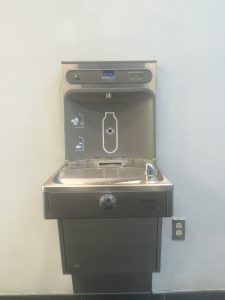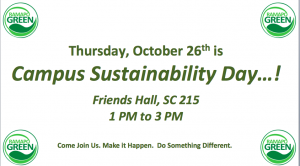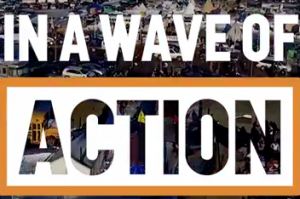- About Ramapo
- Academics
- Admissions & Aid
- Student Life
- Athletics
- Alumni
- Arts & Community
- Quick Links
- Apply
- Visit
- Give
Ramapo Green
October 21, 2017CAMPUS SUSTAINABILITY DAY, THURSDAY, OCTOBER 26, 2017, 1-3 PM
A bunch of us went to the AASHE Conference in San Antonio, and feasted on an amazing array of ideas and products promoting campus sustainability
Join us, and we share these with the RCNJ community.
Categories: Sustainability
April 18, 2017RCNJ PEOPLE'S CLIMATE MARCH, APRIL 29TH, 2017
By Heather Darley
On Saturday, April 29th, 2017 at approximately 4AM, a bus filled with passionate and united Ramapo College students, staff, faculty, and alumni will be departing for Washington D.C. to make our voices heard in the People’s Climate March. With our current political climate, now more than ever, we need to gather together and stand up for our planet and our people.
We will peacefully take to the streets of Washington D.C. passing by the White House, the National Mall and the U.S. Capitol Building on the 100th day of the Trump Administration. Our presence and message will let world leaders know we’re concerned about the climate crisis and want to work together take action and build solutions.
Please stand up and join us in this movement. Whether you’re concerned for our ever-changing climate, protecting our planet, or fighting for future generations, you have the chance to march and be a part of history. Ramapo College marched in the 2013 Forward On Climate March in DC and the 2014 People’s Climate March in NYC. Become a part of our Ramapo College tradition of speaking up against environmental injustices and promoting sustainable solutions.
More on the People’s Climate March here.
Snag your bus ticket on our Ramapo College PCM Bus Registration Page.
Bus tickets are $22.09 and partially funded by the Ramapo College Student Government Association and the People’s Climate March organizers.
Any questions or concerns about attending the People’s Climate March? Please don’t hesitate to reach out to the RCNJ-PCM Bus Captain, Heather, at hdarley@ramapo.edu
Categories: Sustainability
February 9, 2017SUSTAINABLE LIVING ECO-STEWARDSHIP PROGRAM
The Sustainable Living Eco-stewardship (SLE) Program is a new initiative of Ramapo Green to actively engage undergraduate students in green lifestyles and sustainability action on campus. SLE draws from the tradition of our Sustainable Living Facility (SLF) program, which was initiated in Fall 2010, and aims to broaden the agenda to include a stewardship program to promote sustainability outreach and build a conscientious student community on campus through peer education.
The program has many benefits to students besides the opportunity to live in the Village and in the Redwood CPA (for sophomores). Facilities for students include access to Ramapo vegetable gardens, compost facilities, electricity submetering—all of which are useful aids to reducing ecological footprints. From a learning vantage, the program offers opportunities to student learning about growing food, composting, building connections with local community networks such as MEVO, NY NJ Trail Conference, leadership and running sustainability campaigns on campus. In addition, the program’s experiential component, through the1 unit independent study, adds academic value.
This is indeed an excellent opportunity to live, learn and share with a community of Eco-stewards. View the details and application form here.
Categories: Sustainability
September 15, 2016Campus Sustainability Town Hall, Fall 2016
The President’s Committee on Campus Sustainability (PCCS) hosted a Town Hall on Wednesday, September 14, 2016 in the Alumni Lounges. Professor Michael Edelstein presented a brief but deep history of sustainability at Ramapo College. Following that, the PCCS laid out a comprehensive view of all that is currently being done with regard to campus sustainability at RCNJ.
Categories: Sustainability
August 31, 2016Sustainability-Oriented Study Abroad Programs
Combine the huge benefits of a Study Abroad Experience with an intensive opportunity to engage with sustainability outside the North American frame.
Explore the entirely unique possibilities here.
“Sustainability, broadly defined as the Triple Bottom Line (People, Planet, Prosperity), touches every aspect of the human condition. And thus it is that a sustainability thread can be found running through every Major offered at Ramapo College. As such, we would argue that every student benefits immensely from participation in a Sustainability-oriented Study Abroad Program.
“Of course, travel really does broaden the mind. But more significantly than that, a Sustainability-oriented Study Abroad experience gives us the ability to switch contexts, to be able to see the world through a lens that is entirely different than the one we are accustomed to using. The ability to switch perspectives, to view things from a point-of-view other than our own, to change the frames we make in how we take the world, this is probably the most extraordinary gift that such a Study Abroad experience can give. We become transformed, in the process of stepping into someone else’s worldview. And our capacity for empathy is hugely enhanced.
“Experiencing life in other countries and cultures, developing foreign language skills, broadening our views of the world, and making lifelong friends while earning college credits are just some of the ways students benefit from their time abroad. For many students, the Study Abroad opportunity triggers the move to graduate school, or opens entirely new prospects for future employment. Over the years, we have found that students remember and value their Sustainability-oriented study abroad experiences for the rest of their lives. It is, in a word, transformative.”
Categories: Sustainability
August 11, 2016Ramapo Signs Up With Campus Wall
If you want to give away, sell, buy or trade things you no longer need, try visiting Campus Wall. Choose Ramapo College of New Jersey, create an account with your Ramapo email address, and you’re all set to reduce your waste stream by promoting the reuse of things you might normally toss into the trash. Enjoy…!
Categories: Sustainability
May 23, 2016Ramapo Green Newsletter Spring 2016
Ramapo Green Newsletter
Spring 2016, Issue 2
Hydration Stations
Hydration stations are being installed in Mackin, Bischoff, the Student Center and the Bradley Center over the summer. The newly installed hydration stations will surely help kick-start 1-STEP’s Fall “Rethink Water” campaign led by Pamela Gilligan and Emily D’Maio. The new hydration stations will absolutely make us want to use reusable bottles and reduce plastic water bottle use on campus!!Hope you have checked out the hydration stations in the A, C and G wing of the academic complex.

Better Building Alliance
Ramapo College has chosen to join with the US Department of Energy’s Better Building Alliance, in an effort to better measure and manage our ongoing efforts to make sure our buildings perform as sustainably as possible.
Sub-Metering
The electrical connections to all traditional Residence Halls have been sub-metered, allowing us to more effectively measure electricity usage by building, and to find ways of further reducing the campus carbon footprint. Electric meters have been installed in Village, Pine, Linden, Laurel, Overlook, Mackin, Bischoff, Buckeye, Holly and the Student Center. The meters will be integrated into a kiosk/dashboard system that everyone can access and will have the capability to generate monthly usage reports. Meters will also be installed in the CPAs as the renovations progress.
Auxiliary Gym Lighting Retrofit:
We have ordered new LED lighting fixtures for the auxiliary gym. Our in house electricians will be installing the fixtures in June. They will use much less energy, produce more light and start up faster to increase safety.
AASHE Membership Renewed
Ramapo College Student Clubs have renewed our annual membership to the Association for the Advancement of Sustainability In Higher Education (AASHE). This site (aashe.org) is a goldmine of information on case studies and reports pertaining to campus sustainability within North America. Anybody with a Ramapo College email address can create an account at the site and gain access to a huge amount of information.
Use Campus Wall to Give Away, Sell, Buy, or Exchange Stuff
Go to campuswall.com, create an account with your Ramapo College email address, and list things you no longer need, look for things you do need, contribute to the sharing economy…!
Categories: Sustainability
February 2, 2016First Meeting of the Ramapo College Environmental Studies Alumni Association Steering Committee
Current students and alumni alike were excited to be gathering together last Thursday night for the very first meeting of the Environmental Studies Alumni Association Steering Committee. They gathered in the Sharp Sustainability Education Center (SSEC) to discuss the structure, purpose, and intentions of this newly formed group. While the Environmental Studies community at Ramapo boasts a 200-member Facebook group, annual reunions, and numerous campus events, there has never been a group of people dedicated to the connecting, networking, inspiring, and sharing necessary to enrich and enliven the environmental programs Ramapo has to offer. And so, during an Environmental Studies reunion last year, the Alumni Association Steering Committee was born.
First on the agenda? A name! It was agreed by the group that a fitting name would be voted on at the next meeting. Additionally, the group agreed a mission statement would be required. As a result, a robust conversation about the goals of the committee ensued. The primary discussion centered around communication and connecting – using social media platforms as well as email and events to bring past and current students together.
Beyond bringing the Environmental Studies community together, the committee agreed that they should play a supportive role in promoting and enriching the current programs Ramapo has to offer in the Environmental Studies field. The unique perspective of the alumni in the group could provide the support these programs need to continue to flourish and grow. Additionally, it was agreed that committee members should be active and engaged in facilitating, promoting, and attending events held on campus.
It was clear by the conversation in the room that the value of creating a strong Environmental Studies community beyond graduation could not be understated. Whether a current student looking for career potential or an alumnus looking to stay involved and continue their education, a lively and engaged Environmental Studies community, the group agreed, is essential. The Environmental Studies Alumni Association Steering Committee intends to promote, support, and maintain this lively community in whatever capacity they are capable. At the conclusion of the evening, the group left feeling energized and inspired, ready to bring ideas to the next meeting to put these intentions into action.
Written by Grace Whitney ’13, Healthcare Sustainability Specialist, Stericycle
Categories: Sustainability
January 28, 2016Healing Hospitals: Advancing Sustainability in Healthcare
Kyle Tafuri ’13 opens the Ramapo College Expert Practitioners in Sustainability series with a lecture on sustainability and hospitals
As Senior Sustainability Advisor to Hackensack University Medical Center (HUMC), Kyle Tafuri, alumnus of the RCNJ Master of Art in Sustainability Studies program, has made a tremendous impact in only three and a half years on the job. He offered a view into his world Wednesday evening at the first talk of the 2016 lecture series “Lessons of Sustainability: Voices of Key Practitioners” to an attentive audience in Friends Hall .
Hospitals are huge energy consumers and produce a lot of waste. There are over 20 different waste streams at the hospital that need to be dealt with, and, through education and habit change, they have been able to reduce the amount of non-hazardous waste ending up in the hazardous waste bags, helping to save the hospital money and reduce the amount of waste by half.
The key to Tafuri’s success at HUMC has been aligning sustainability initiatives with the overriding mission of the hospital as a bastion of public health in the community. “This is how I got a room full of highly-educated doctors and executives to let me tell them what to do,” he explained. “I showed that my sustainability mission is in line with their healthcare mission.”
His presentation included numerous facts and examples. He explained to the audience the many waste streams that are generated by the state’s largest hospital, and how some of them are disposed of. He then illustrated how the different waste streams have different costs – both financially and environmentally, and how he was able to save the hospital hundreds of thousands of dollars by changing staff habits (and removing some receptacles) to reduce the amount of non-contaminated waste put into “red bags” that have a much greater cost than regular waste or recycling. With funding always an issue in healthcare, administrators were very pleased to apply those savings to patient care.
Statistically, nurses have the highest rate of occupation-related asthma due to the many chemicals and materials they are exposed to daily. “Do you want to go to a hospital to get treated for pneumonia and be exposed to chemicals that make it hard to breathe?” Kyle asked. Seeing the hospital as a place that should set an example of health in its own environment helped gain support for initiatives as diverse as moving to Eco-Logo certified cleaning chemicals, working to remove harmful types of plastics present in everything from IV lines to incubators, banning carcinogenic flame retardants from furniture and mattresses, and working toward getting antibiotic-free meat for patient meals. He also gave examples of initiatives tied to HUMC’s mission to promote public health within the community.
Tafuri has worked to find products that cause less harm to the people working and visiting the hospital. He has worked with suppliers to try and find out what is in products, in order to get ones that will not cause any harm. An example of this is products that use flame retardant chemicals. Flame retardants contain carcinogens and that is something that should not be used in hospitals. Tafuri called up their furniture suppliers and told them that if they could not provide the hospital with flame retardant free furniture, they would find another company that would. Now the hospital has furniture that does not contain flame retardants. The hospital has also worked on the food they serve. They no longer serve soda and have antibiotic-free chicken. Many of the hospitals that are a part of Hackensack University Medical Center also have green spaces for people to have lunch breaks or sit and relax. For instance, many of the accessible rooftops have been turned into gardens, which help patients and staff relax and provide therapeutic benefits.
In a separate seminar afterward with MASS students, Kyle answered questions and went into more depth about how he achieved his goals. His first advice was to learn the politics (who gets things done? How? What is the selling point for the person you’re talking to?) and to build alliances: “Find the passionate people.” He provided an example of using purchasing power to force vendors to make changes. Other methods he discussed included using sustainability goals as part of employee performance incentives, changing to match existing priorities and latching on to them, and doing what you can rather than waiting for the perfect solutions. Winning national “green” hospital awards two years running and being asked to address members of congress doesn’t hurt, either.
This was the first in what promises to be a wonderful series of talks, titled Creating a Sustainable World: Voices of Key Practitioners.
Written by Heather McAdam & Taylor Donohue
Categories: Sustainability
November 5, 2015Campus Sustainability Day: Brainstorming Ways to Make the College Greener
At Campus Sustainability Day, held on Thursday, October 22, 2015, a brainstorming session was held to generate ideas for ways in which the College could go greener. The following ideas were proposed:
- Solar Panels on Campus
- Wind Turbines on Campus—near Rte. 202
- Improve recycling bins, signage and collection procedures
- More Hydration Stations on Campus
- More Motion Detector Light Switches, Low-flo Showers and Toilets, Flushless Urinals
- Signage in every office and classroom, urging folks to turn off the lights when they leave
- Set expectations for incoming students during Orientation
- Require a Sustainability Course for all students
- Establish a Major and a Minor in Sustainability
- Hire a Sustainability Coordinator for the Campus
- Vend Refillable Water Bottles near all Soda and Water Machines
- Equip Labs with Solar and Biogas
- Recycle “Grey Water”
- Ban Vehicle Idling on Campus
- Better signage for Waste Management
- Better publicity and advertising for Carpooling Resource
- EV Charging Stations on Campus
- Install Water Filters in all Dorm Room Sinks
- Better signage in Dorm Laundry Rooms, for Water and Energy Conservation
- Energy Conservation Contests in Residence Halls
- Establish more Wildflower Meadows and Student Gardens on Campus
- Install signage at all Campus Sustainability Features
- Sustainability-related Scavenger Hunts
- Better continuity and succession planning for student-led sustainability events (such as Spring Into Sustainability…collecting reusable discards on Move-out Day)
- Get Sodexo to offer, and students to use, more Vegetarian and Vegan options
- Lobby Student Government and Student Trustees for increased support of sustainability actions on Campus
- Establish class-credit based initiatives
- Establish a Ramapo “Marketplace,” where students can sell things they make
- Install a demonstration Compostable Toilet on Campus
- Get Dining Services to switch to compostable cutlery
- Give students Refillable Coffee Cups
Categories: Sustainability
Copyright ©2025 Ramapo College Of New Jersey. Statements And Policies. Contact Webmaster.




Follow Ramapo Green